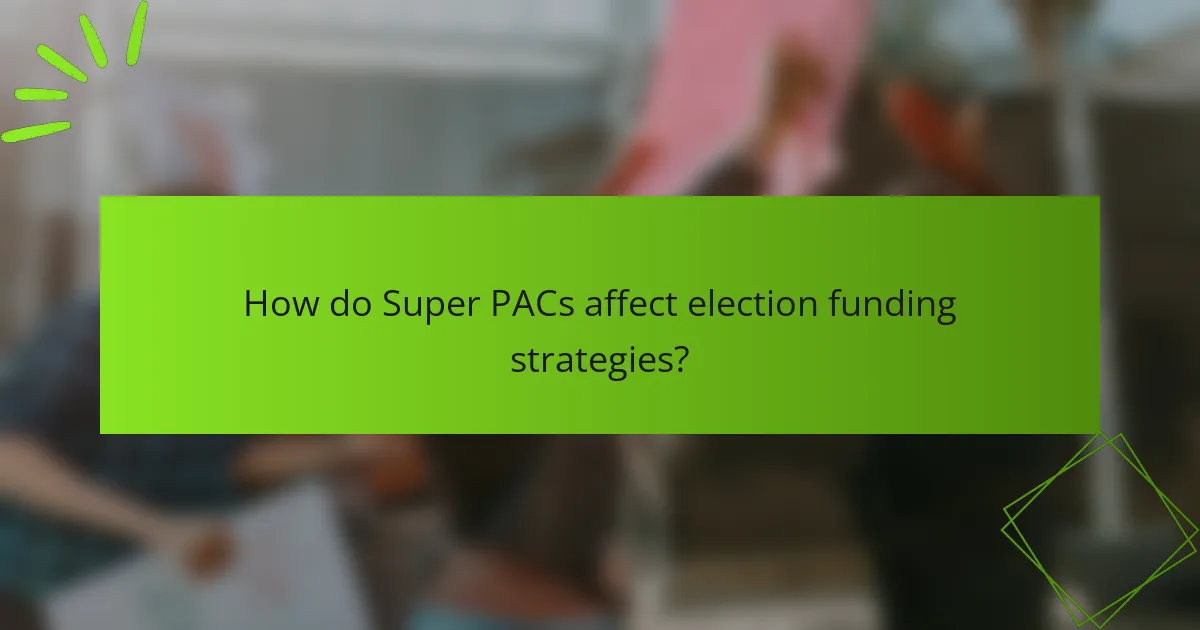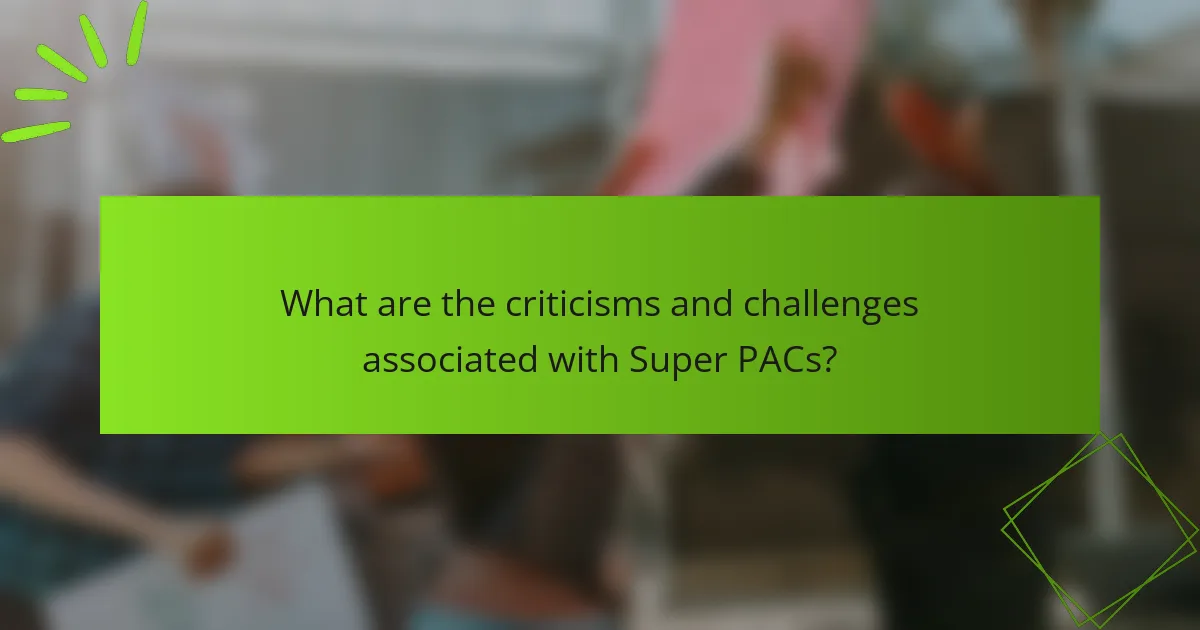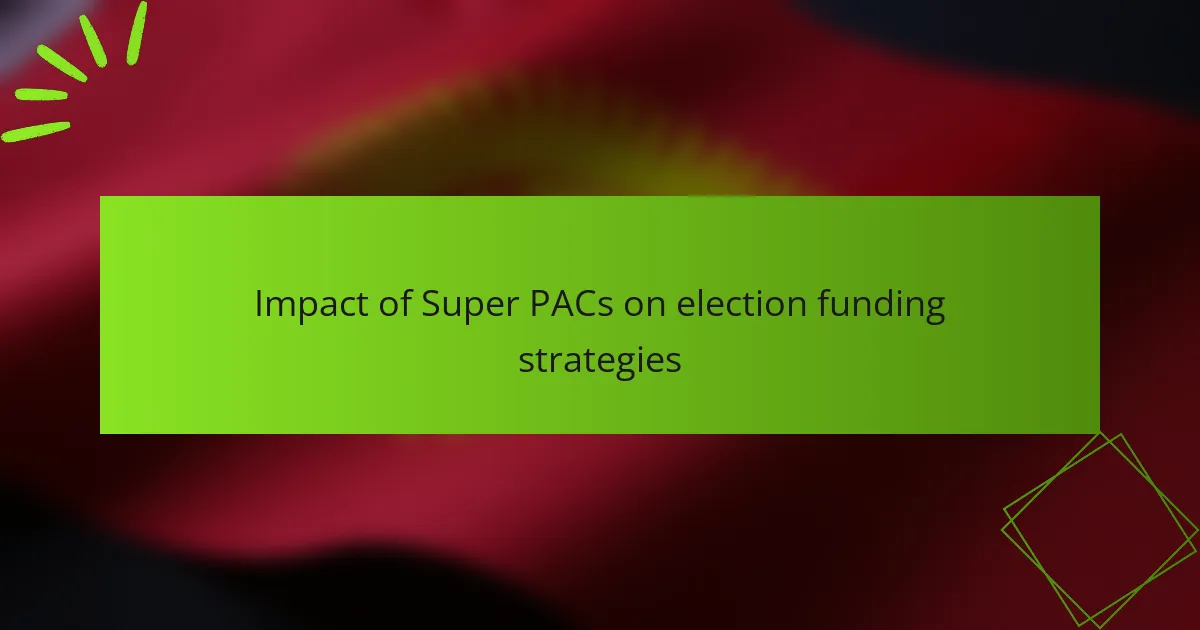Super PACs, or Political Action Committees, are organizations that can raise and spend unlimited funds to influence political candidates without direct coordination with their campaigns. Established after the 2010 Supreme Court ruling in Citizens United v. FEC, Super PACs play a crucial role in election funding strategies, significantly impacting voter perceptions through extensive advertising and outreach efforts. In the 2020 election cycle alone, Super PACs spent over $2.7 billion, reshaping traditional funding dynamics and raising concerns about the influence of wealthy donors on democratic processes. Criticisms surrounding Super PACs include issues of transparency, accountability, and the potential for negative campaigning, which contribute to ongoing debates about the role of money in politics.

What are Super PACs and their role in election funding?
Super PACs, or Political Action Committees, are organizations that can raise unlimited funds to advocate for or against political candidates. They emerged following the 2010 Supreme Court decision in Citizens United v. FEC. This ruling allowed corporations and unions to spend unlimited amounts on independent political expenditures. Super PACs operate independently from candidates’ campaigns, meaning they cannot coordinate directly with them. Their role in election funding is significant, as they can influence elections through massive advertising campaigns and outreach efforts. In the 2020 election cycle, Super PACs spent over $1.5 billion, showcasing their financial impact. This spending can sway public opinion and affect election outcomes.
How do Super PACs differ from traditional PACs?
Super PACs differ from traditional PACs primarily in their ability to raise and spend unlimited amounts of money. Traditional PACs are limited in how much they can contribute to candidates and parties, capped at $5,000 per election cycle. In contrast, Super PACs can accept donations from individuals, corporations, and unions without any limit.
Additionally, Super PACs are not allowed to coordinate directly with candidates or political parties. This independence allows them to operate more freely in supporting or opposing candidates. Traditional PACs, however, often work closely with specific candidates and are subject to stricter regulations regarding their activities.
The rise of Super PACs has significantly impacted election funding strategies. They have become a major source of funding for campaigns, especially in competitive races. In the 2020 election cycle, Super PACs spent over $1 billion, illustrating their growing influence in American politics.
What legal frameworks govern Super PACs?
Super PACs are governed by federal laws, primarily the Federal Election Campaign Act (FECA). FECA regulates the contributions and expenditures of political committees. Super PACs can raise unlimited funds from individuals, corporations, and unions. However, they must operate independently of candidates and their campaigns. The Supreme Court’s decision in Citizens United v. FEC (2010) significantly impacted Super PACs. This ruling allowed for unrestricted independent expenditures by Super PACs. Additionally, the Bipartisan Campaign Reform Act (BCRA) also affects their operations by limiting certain types of contributions. Super PACs must disclose their donors and expenditures to the Federal Election Commission (FEC). This transparency is essential for maintaining oversight in political funding.
What are the primary functions of Super PACs in elections?
Super PACs primarily function as independent expenditure-only committees in elections. They raise and spend unlimited amounts of money to influence electoral outcomes. Super PACs cannot coordinate directly with candidates or political parties. They primarily focus on supporting or opposing specific candidates through advertisements. These organizations can also engage in grassroots mobilization efforts. Super PACs emerged following the Citizens United v. FEC ruling in 2010, allowing for greater financial contributions. Their activities significantly impact the funding landscape of elections. Super PACs often receive substantial contributions from corporations and wealthy individuals, shaping political discourse.
Why are Super PACs significant in modern election strategies?
Super PACs are significant in modern election strategies because they allow for unlimited fundraising and spending to influence elections. They can support or oppose candidates without directly coordinating with their campaigns. This independence enables Super PACs to mobilize substantial financial resources. In the 2020 election cycle, Super PACs raised over $1.5 billion, highlighting their financial impact. They often focus on negative advertising, which can sway voter opinions. Super PACs amplify the voices of wealthy donors, affecting election outcomes. Their role has transformed the political landscape, making fundraising a key strategy for candidates.
How do Super PACs influence voter behavior?
Super PACs influence voter behavior by spending large sums on political advertising and outreach. They can shape public perception of candidates through targeted messaging. Super PACs often focus on key issues that resonate with specific voter demographics. Their advertisements can increase name recognition for candidates. Research shows that voters exposed to Super PAC ads are more likely to support the advertised candidates. A study by the Brennan Center for Justice found that Super PAC spending significantly correlates with shifts in voter opinion. Additionally, Super PACs can mobilize voters by promoting grassroots campaigns. Their influence can lead to increased voter turnout among supporters.
What impact do Super PACs have on campaign messaging?
Super PACs significantly influence campaign messaging by funding advertisements and communications that align with their political agendas. They can shape narratives by amplifying specific issues or candidate attributes. This funding often allows for more aggressive and targeted messaging than traditional campaign financing. Research indicates that Super PACs spent over $1 billion in the 2020 election cycle, altering the landscape of campaign communication. Their ability to create and disseminate content quickly can sway public opinion and voter perceptions. This impact is particularly pronounced in competitive races, where messaging can be decisive. The presence of Super PACs often leads to more polarized and issue-focused messaging in campaigns.

How do Super PACs affect election funding strategies?
Super PACs significantly influence election funding strategies by allowing unlimited contributions from individuals and organizations. They can raise and spend money independently of candidates. This independence enables Super PACs to launch extensive advertising campaigns. In the 2020 election cycle, Super PACs spent over $2.7 billion, shaping voter perceptions. Their ability to aggregate large sums of money alters traditional funding dynamics. Candidates often rely on Super PACs to amplify their messages. This reliance can shift the focus from grassroots fundraising to large donor contributions. Overall, Super PACs create a landscape where financial power heavily impacts electoral outcomes.
What funding mechanisms do Super PACs utilize?
Super PACs utilize various funding mechanisms, primarily through unlimited contributions from individuals, corporations, and unions. They can raise and spend unlimited amounts of money to influence elections. Unlike traditional political action committees, Super PACs cannot coordinate directly with candidates or political parties. Contributions to Super PACs are often made anonymously, allowing donors to remain undisclosed. The Federal Election Commission regulates these entities but does not impose limits on the amounts raised. In the 2020 election cycle, Super PACs raised over $1 billion, highlighting their significant role in campaign financing. This funding structure enables Super PACs to exert substantial influence on election outcomes.
How do individual donations to Super PACs compare to traditional funding?
Individual donations to Super PACs are generally larger and more unrestricted compared to traditional funding sources. Super PACs can accept unlimited contributions from individuals, corporations, and unions. This contrasts with traditional campaign funding, which is subject to strict contribution limits. For example, individuals can donate up to $2,900 to a candidate’s campaign but can give significantly more to Super PACs. In the 2020 election cycle, Super PACs raised over $1.5 billion, demonstrating their financial influence. This shift allows wealthy donors to exert greater control over political messaging and candidate support.
What are the implications of unlimited contributions to Super PACs?
Unlimited contributions to Super PACs lead to significant implications for political financing. They enable wealthy individuals and organizations to exert substantial influence on election outcomes. This creates an uneven playing field where candidates with more financial backing can dominate media coverage and voter outreach. Research indicates that Super PACs can raise and spend unlimited amounts of money, which can skew the democratic process. For instance, during the 2020 election cycle, Super PACs spent over $1 billion on political advertising. This influx of funds can lead to greater polarization in political discourse, as candidates may cater to the interests of their major donors. Ultimately, unlimited contributions to Super PACs can undermine public trust in the electoral system by fostering perceptions of corruption and inequality.
How do Super PACs shape candidate fundraising efforts?
Super PACs significantly influence candidate fundraising efforts by allowing unlimited contributions from individuals and organizations. They operate independently from candidates, enabling them to raise and spend money without direct coordination. This independence allows Super PACs to amplify a candidate’s message through advertisements and outreach. In the 2020 election cycle, Super PACs spent over $1.5 billion, showcasing their financial impact. Candidates often align their strategies with Super PACs to maximize funding opportunities. This relationship can lead to increased visibility and support during campaigns. Super PACs can also shift the focus of fundraising efforts from small donations to large contributions. This shift changes the dynamics of campaign financing in favor of affluent donors.
What strategies do candidates use to align with Super PACs?
Candidates use several strategies to align with Super PACs. They often engage in direct communication to establish shared goals. This includes discussing policy priorities that resonate with the Super PAC’s agenda. Candidates may also participate in fundraising events organized by these PACs. By doing so, they can strengthen their connections and gain financial support. Furthermore, candidates often tailor their messaging to align with the interests of the Super PAC. This strategic alignment can enhance their visibility and appeal to specific voter demographics. Research indicates that candidates who effectively align with Super PACs often experience increased funding and support during elections.
How do Super PACs impact the overall funding landscape of elections?
Super PACs significantly alter the funding landscape of elections by allowing unlimited contributions from individuals and corporations. This capability leads to a substantial increase in the overall financial resources available for political campaigns. In the 2020 election cycle, Super PACs raised over $2.7 billion, highlighting their financial clout. They can spend independently of candidates, creating a distinct separation between candidate fundraising and independent expenditure. This independence often results in aggressive advertising and outreach strategies that can sway public opinion. Additionally, Super PACs can amplify the voices of wealthy donors, creating potential disparities in campaign visibility. Their influence raises concerns about the impact of money on democratic processes and voter representation. Overall, Super PACs reshape electoral dynamics by intensifying competition through enhanced funding capabilities.

What are the criticisms and challenges associated with Super PACs?
Super PACs face significant criticisms and challenges. One major criticism is their potential to undermine democratic processes. Critics argue that Super PACs enable wealthy donors to exert disproportionate influence on elections. This can lead to a lack of transparency in campaign financing. Many Super PACs do not disclose their donors, raising concerns about accountability. Furthermore, Super PACs can contribute to negative campaigning. This often results in a toxic political environment. Research indicates that Super PAC spending can escalate campaign costs, making it harder for smaller candidates to compete. Overall, these factors contribute to ongoing debates about the role of money in politics.
What ethical concerns arise from the influence of Super PACs?
Super PACs raise several ethical concerns related to political influence. They can enable excessive spending by wealthy individuals or corporations, undermining the principle of equal representation. This financial power may lead to a disproportionate influence on candidates and policies. Super PACs often operate with minimal transparency, making it difficult for voters to know who is funding political messages. This lack of disclosure can erode public trust in the electoral process. Furthermore, the potential for quid pro quo arrangements raises questions about corruption and accountability in governance. Studies have shown that increased Super PAC spending correlates with a rise in negative campaigning, impacting the overall political discourse.
How do Super PACs affect public trust in the electoral process?
Super PACs generally reduce public trust in the electoral process. Their ability to raise unlimited funds from individuals and corporations creates perceptions of unfair influence. Many citizens believe that wealthy donors have disproportionate power over political outcomes. This perception can lead to skepticism about the integrity of elections. Studies show that increased spending by Super PACs correlates with decreased voter confidence. For instance, a 2018 survey by the Pew Research Center found that 70% of Americans felt that money in politics undermines democracy. This growing concern about financial influence can discourage voter participation. Ultimately, the operation of Super PACs can foster a belief that elections are not truly representative of the electorate’s will.
What measures have been proposed to regulate Super PACs?
Proposed measures to regulate Super PACs include stricter contribution limits and enhanced transparency requirements. Lawmakers suggest capping individual contributions to Super PACs. This aims to reduce the influence of wealthy donors on elections. Additionally, proposals advocate for mandatory disclosure of donors’ identities. Transparency initiatives would require Super PACs to report contributions and expenditures regularly. Some proposals also call for limiting the coordination between Super PACs and candidates. These measures seek to create a more equitable electoral process. Historical attempts at reform include the DISCLOSE Act, which aimed to improve transparency in campaign finance.
How do Super PACs interact with grassroots movements?
Super PACs often support grassroots movements through funding and strategic alignment. They provide financial resources that grassroots movements may lack. This financial backing can amplify the reach and visibility of grassroots initiatives. Super PACs may also share messaging and mobilization strategies with these movements. This interaction can create a synergy that enhances political influence. However, it can lead to concerns about the authenticity of grassroots efforts. Critics argue that Super PAC involvement may overshadow genuine grassroots voices. Overall, the relationship is complex and can vary based on specific political contexts.
What challenges do grassroots campaigns face in competing with Super PACs?
Grassroots campaigns face significant challenges when competing with Super PACs. Super PACs can raise unlimited funds from individuals and corporations. This financial advantage allows them to outspend grassroots efforts dramatically. For instance, in the 2020 election cycle, Super PACs spent billions, overshadowing smaller campaigns. Grassroots campaigns often rely on small donations from individual supporters. This funding model limits their overall budget and reach. Additionally, Super PACs can afford extensive advertising and outreach. This creates a disparity in visibility and voter engagement. The regulatory environment also favors Super PACs, complicating the landscape for grassroots initiatives. Overall, the financial power and resources of Super PACs create formidable barriers for grassroots campaigns.
How can grassroots movements leverage Super PACs to their advantage?
Grassroots movements can leverage Super PACs by aligning their goals with the PAC’s funding strategies. Super PACs can provide substantial financial support for campaigns that resonate with their mission. By forming partnerships, grassroots movements can amplify their messaging through Super PAC advertising. This collaboration can enhance visibility and reach a broader audience. Additionally, grassroots movements can influence Super PAC agendas to prioritize issues important to their constituents. Historical examples show that movements like the Tea Party utilized Super PACs effectively to gain traction. These strategies allow grassroots movements to maximize their impact on electoral outcomes.
What best practices can candidates adopt when working with Super PACs?
Candidates should maintain clear communication with Super PACs. This ensures alignment on campaign goals and messaging. Transparency about fundraising strategies is crucial. Candidates must also comply with all legal regulations regarding coordination. Regular updates on campaign progress can help Super PACs adjust their strategies effectively. Candidates should be aware of the potential influence Super PACs have on public perception. Engaging in joint fundraising events can strengthen partnerships. Understanding the Super PAC’s donor base can inform campaign outreach efforts. These practices can enhance the effectiveness of collaboration with Super PACs.
Super PACs, or Political Action Committees, are organizations that can raise unlimited funds to influence political candidates without direct coordination with their campaigns. This article explores the role of Super PACs in election funding strategies, highlighting their significant financial impact, particularly in the 2020 election cycle where they spent over $2.7 billion. It discusses the differences between Super PACs and traditional PACs, the legal frameworks governing their operations, and their influence on voter behavior and campaign messaging. Additionally, the article addresses the criticisms surrounding Super PACs, including their effect on public trust in the electoral process and the challenges faced by grassroots movements in competing with their financial power.
